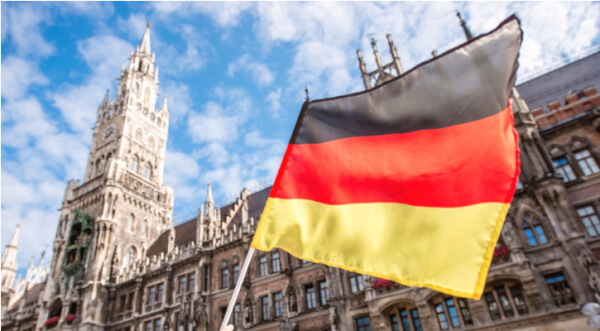Renting in Frankfurt, Germany as an American: What to know
Thinking about moving to Frankfurt? Find out what you need to know about renting in Frankfurt, Germany in this guide.

Many expats live and work in Germany. As one of the most powerful economies in the world, it’s an attractive place - but it can also be an idea to upgrade your work visa, and opt for German citizenship instead. Why? The German passport has been dubbed the ‘most powerful passport in the world’, based on the number of countries holders can visit visa-free. Get your hands on a German passport and you can go to 176 from a possible 218 countries without needing to fill out a single visa from.
So, whether you’re just now applying for a work visa in Germany or you’re an expat already there, it’s good to know your options when it comes to switching over to German citizenship.
Here’s a quick guide to why you might want to get German citizenship - and how you can go about it.
Citizens of Germany have different rights (and responsibilities) to migrants holding permanent residence. For example, one benefit of being a German citizen is the right to vote, and protection against extradition and deportation from Germany.
However, as a fully fledged German citizen, you can also be called up one to act as a lay judge or electoral assistant.
Naturally, Germany has strong ties to Europe, and is core a member of the EU. This also means that its citizens enjoy the right to live and work freely across all member states, as well as some access to free healthcare elsewhere in Europe.
You can apply for German citizenship if you fulfil residency requirements or have a German parent. Alternatively, if you were born in Germany (but your parents aren't German), you might also be entitled to claim German citizenship under some circumstances.
There are a number of different routes to citizenship, which are set out below. The exact details of the process for application can vary slightly depending on the region of Germany in which you live, so you should find your local naturalisation authority website to get the most relevant details for you.
Regardless of the route you’re applying to, there are also general eligibility requirements placed on all applicants, such as being of good character and pledging allegiance to the German constitution. You should also be able to support yourself financially without resorting to state support, in most circumstances.
Applications for German citizenship are managed by local naturalisation authorities, and the Federal Ministry of the Interior. The Ministry website is a great place to look for process details, and your local naturalisation authorities can help with detailed information about the naturalisation process and links to application forms.
It’s sometimes possible to be the citizen of two or more countries simultaneously, known as dual or multiple citizenship. In general, however, this isn't possible in Germany, unless you're the child of foreign parents, born and raised in Germany. In this case, if you meet fairly strict criteria, you may be allowed to hold German citizenship alongside that of your parents’ nationality.
There’s also an exception made for citizens of other EU countries, who may be allowed to hold their previous nationality alongside German citizenship. Whether or not this is feasible also depends on the law of the country of first citizenship.
In most cases, though, you’ll have to give up your previous nationality to accept German citizenship. However, this is a fairly complex area and there are some further exceptions which are made, in addition to the main ones outlined here. If you’d like to hold dual citizenship, including German nationality, it’s worth seeking the advice of a specialist
Depending on your personal circumstances there are several different ways you can claim German citizenship. Aside from those outlined below, there’s also a citizenship route for refugees, or those qualifying on humanitarian grounds, and some discretionary powers held for special circumstances. It’s usually easier to become a naturalised German citizen if you're stateless or displaced.
If you don't qualify to apply for German citizenship under any of the routes specified below, then you can apply for naturalisation due to your residency. To do this you must have lived legally in Germany for at least eight years, and be able to speak German to an acceptable level. A knowledge of German is mandatory, and you’ll be expected to read, understand and speak at a level which matches your age and education. You might have to complete a naturalisation test as part of your application.
If you’ve been in Germany for seven years already, you might be able to take an integration course, and then apply immediately without waiting for the full eight years to pass.
Although investing in Germany might be one route to getting an initial work visa, and permanent residency, it does not guarantee citizenship. You’d still be required to fulfil residency criteria and show a genuine commitment to the country in order to get citizenship, no matter how much you invest.
You’re considered a German citizen through descent if at least one of your parents was a German citizen when you were born. This applies even if you were born outside of Germany.
On the other hand, if you’re a child born in Germany, but to foreign parents, you may also be able to claim German citizenship, depending on the residence history of your mother and father.
If your spouse or registered partner (including same sex partnerships) is German, then you’re eligible to apply for German citizenship after three years of legal residence in Germany. For the two years prior to your application, you must have been in the relevant relationship, and you’ll also have to comply with the general eligibility requirements.
The basic route for applying for citizenship is the same, whatever the grounds for your application, but is managed at a local level through regional naturalisation authorities. You must therefore find your local authority and follow their procedure. In many cases you’re able to visit to have an advice session with the authority representatives before you complete your application, to have any questions answered.
Don’t forget that knowledge of German is a prerequisite for citizenship - so the application process will be completed, naturally, using German.
Fees are payable for all routes to citizenship, although there are concessions available under some circumstances. Local authorities are able to reduce or waive costs if they feel it’s in the public interest. Otherwise, you’ll have to pay EUR 255 for an adult application, or EUR 51 for applications for children.
If you’re applying from abroad and need to make an international money transfer, your bank might not be your best option, as they may use a poor exchange rate and add in administration fees. A better option, if you have a German bank account, or know someone who does, is to use Transferwise, and have your transfer processed using the real exchange rate with only a small transparent fee.
As part of your application to become a German citizen, you might have to take a naturalisation test. This is a multiple choice test with 33 questions. Some of them are specific to the area of Germany in which you live, and some are more general. More than 90% of candidates pass this test.
There are online tests you can practise with, and some local authorities will also help you prepare for the naturalisation test. It’s free to take the test, but the authorities warn against agencies who will charge to help you pass, as they may not have transparent fee structures.
The processing time for your citizenship application depends on your personal circumstances and the workload of your local naturalisation authority. Your local office will be able to give you an idea of processing time when you submit your application or at your advice session if you have one.
Once your citizenship is arranged, you can apply for a German passport. This is done through your local service centre. In general each service centre will only take applications from people living in the local area, so make sure you find the correct place to apply based on your residency. Processes will also vary, so it’s worth checking up exactly what the requirements are to make sure everything goes smoothly.
As getting a passport is a separate process from getting your citizenship, there are further fees to pay. The process of getting your citizenship and passport arranged isn’t cheap, so if you’re not already familiar with money and banks in Germany, it’s a good idea to check out this quick guide.
You can expect to pay fees of around EUR 37.50 if you’re aged 24 or under and EUR 60 for everyone else. If you haven’t already done so, now’s the time to open a bank account to help cut down on costs.
Dealing with bureaucracy is never fun, but at least the process required to get your German nationality is clearly outlined and fairly straightforward. And, even better, if you’re just starting on this journey, you can rest assured you’re on your way to holding one of the most powerful passports in the world.
Good luck on becoming a German citizen!
*Please see terms of use and product availability for your region or visit Wise fees and pricing for the most up to date pricing and fee information.
This publication is provided for general information purposes and does not constitute legal, tax or other professional advice from Wise Payments Limited or its subsidiaries and its affiliates, and it is not intended as a substitute for obtaining advice from a financial advisor or any other professional.
We make no representations, warranties or guarantees, whether expressed or implied, that the content in the publication is accurate, complete or up to date.

Thinking about moving to Frankfurt? Find out what you need to know about renting in Frankfurt, Germany in this guide.

Recently moved to Germany and need a place? In this guide, we'll show you everything you need to know about renting in Germany.

Find all you need to know about getting a job in Germany as an American

Are you or your partner expecting? While this is meant to be a very exciting time in your life, sometimes medical expenses and navigating public or private...

Holidays in Germany are celebrated differently than in many parts of the world. Germans take their holidays very seriously, with celebrations that are steeped...

Germany is so much more than sausages and beer. The country boasts incredibly low unemployment, a high quality of life, and a wonderful mix of history,...